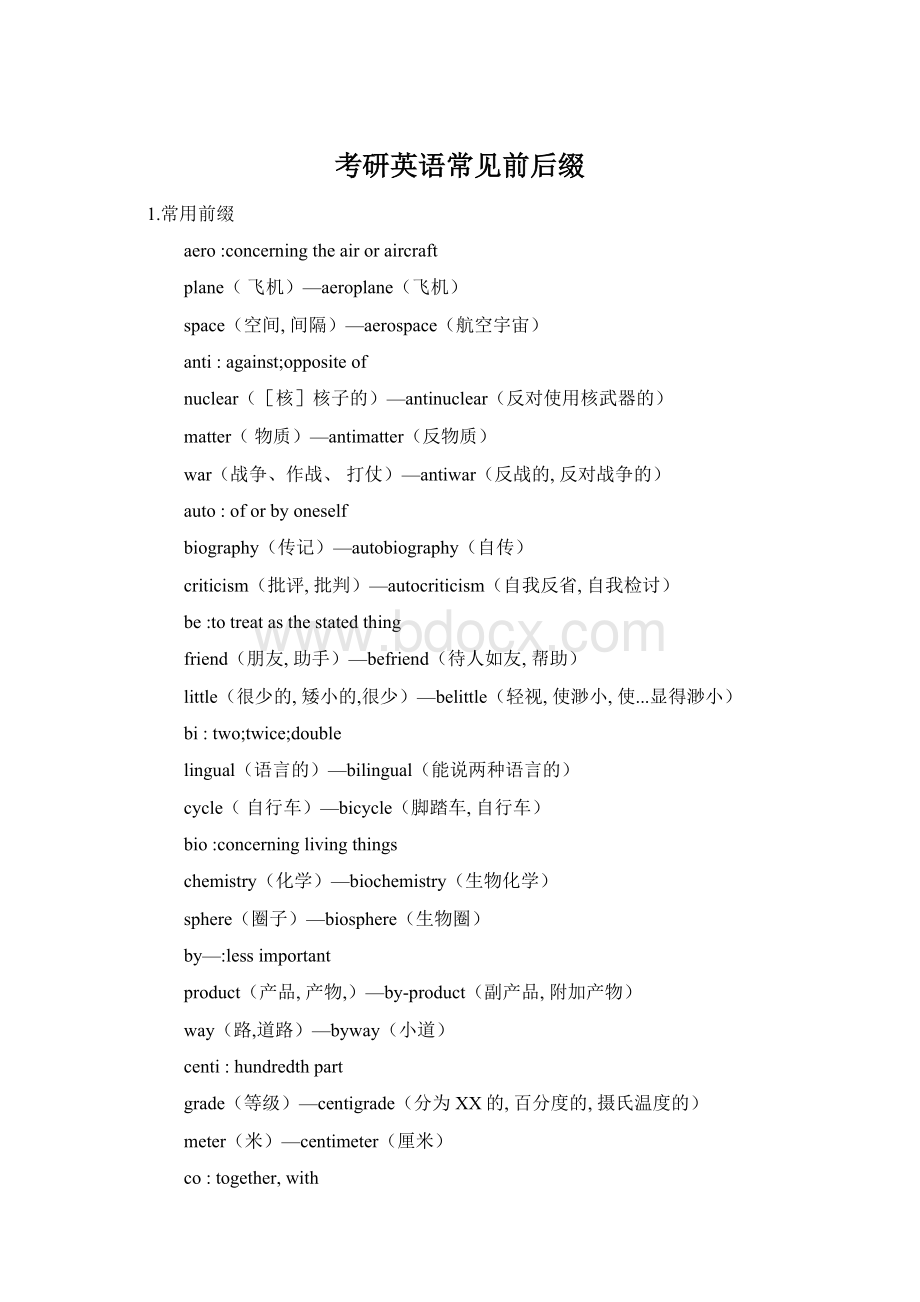考研英语常见前后缀文档格式.docx
《考研英语常见前后缀文档格式.docx》由会员分享,可在线阅读,更多相关《考研英语常见前后缀文档格式.docx(13页珍藏版)》请在冰豆网上搜索。

co:
together,with
author(作家,创造者)—coauthor(合著者,共同执笔者,合著)
exist(存在,生存)—coexist(共存)
col:
(usedbeforel)together,with
location(位置,场所)—collocation(排列,配置)
com:
(usedbeforeb,m,p)together,with
passion(激情,热情)—compassion(同情,怜悯)
con:
together,with
centric(中心的,中央的)—concentric(同中心的)
federation(同盟,联邦,联合,联盟)—confederation(联邦)
contra:
opposite
diction(措辞,用语,言语)—contradiction(反驳,矛盾)
natural(自然的,自然界的)—contranatural(违背自然的)
cor:
(usedbeforer)together,with
relate(叙述,讲,使联系,发生关系)—correlate(使相互关联,和...相关)
respond(回答,响应,作出反应,有反应)—correspond(符合,协调,通信,相当,相应)
counter:
act(担当,表现,见效)—counteract(抵消,中和,阻碍)
attack(攻击)—counterattck(反引力)
cross:
across;
goingbetweenthestatedthingsandjoiningthem
country(乡下的,乡村的,[方]祖国的,故乡的)—crosscountry(越野的,横过田野的)
breed((使)繁殖,教养,抚养,品种,种类)—crossbreed([生物]杂种,异种交配,培育杂种,(使)杂交)
de:
showinganopposite;
toremove;
toreduce
code(代码,密码)—decode(解码,译解)
value(评价,重视)—devalue((=devaluate)减值,贬值)
dis:
not;
theoppositeof
advantage(优势,有利条件)—disadvantage(不利,不利条件,缺点,劣势)
agree(同意)—disagree(不一致,不适宜)
honest(诚实的,正直的)—dishonest(不诚实的)
em:
(usedbeforeb,m,p)tocausetobecome
body(赋以形体)—embody(具体表达,使具体化)
power(权力,激励)—empower(授权与,使能够)
en:
tocausetobecome;
tomake
danger(威胁)—endanger(危及)
large(大的,巨大的)—enlarge(扩大,放大)
ex:
former(andstillliving)
minister(部长,大臣)—exminister(前部长)
wife(妻子)—exwife(前妻)
extra:
outside;
beyond
curricular(课程的)—extracurricular(课外的,业余的)
ordinary(平常的,普通的,平凡的)—extraordinary(非常的,特别的,非凡的)
fore:
inadvance,before;
inoratthefront
arm(臂,武器,装备)—forearm(前臂,准备战斗,预先武装,准备)
warn(警告)—forewarn(预先警告)
il:
(usedbeforel)not
legal(法律的,合法)—illegal(违法的,不合规定的)
literate(学者,有文化的,有阅读和写作能力的)—illiterate(违法的,不合规定的)
im:
(usedbeforeb,m,p)not
moral(道德(上)的,精神的,道德)—immoral(不道德的,邪恶的,放荡的,淫荡的)
possible(可能的)—impossible(不可能的)
in:
not
direct(径直的,直接的)—indirect(间接的,迂回的)
sensitive(敏感的,灵敏的)—insensitive(对...没有感觉的,感觉迟钝的)
infra:
belowinarange;
beyond
red(红(色)的)—infrared(红外线的,红外线)
structure(结构,构造)—infrastructure(下部构造,基础下部组织)
inter:
between;
among
change(改变,变化)—interchange((指两人等)交换,相互交换)
national(国家的,民族的)—international(国际的,世界的,国际性组织,国际比赛)
intra:
inside,within;
into
city(城市,都市)—intracity(市内的)
department(部,局,处,科,部门,系,学部)—intradepartment(内部)
ir:
(usedbeforer)not
regular(规则的,有秩序的)—irregular(不规则的,无规律的)
responsible(有责任的,可靠的)—irresponsible(不负责任的,不可靠的)
kilo:
thousand
gram(克,)—kilogram([物]千克,公斤)
meter(米)—kilometer(公里)
macro:
large,esp.concerningawholesystemratherthanparticularpartsof
particularpartsof
economics(经济学)—macroeconomics(宏观经济学)
structure(宏观结构)—macrostructure(宏观结构)
mal:
badorbadly
function(官能,功能,作用)—malfunction(故障)
treat(宴请,款待)—maltreat(虐待,滥用)
micro:
extremelysmall
computer(计算机,电脑)—microcomputer(微进化)
electronics(电子学)—microelectronics([电子]微电子学)
mid:
middle
day(天,白天)—midday(正午)
night(夜,夜晚)—midnight(午夜)
mini:
small;
short
bus(公共汽车)—minibus(小型公共汽车)
skirt(裙子)—miniskirt
(迷你短裙,超短裙)
mis:
badorbadly;
wrongorwrongly
fortune(运气,好运)—misfortune(不幸,灾祸)
understand(懂,了解)—misunderstand(误解,误会)
mono:
one;
single
plane(飞机)—monoplane(单翼机)
tone(音调,语调)—monotone(单调的,单调)
multi:
morethanone;
many
purpose(目的,意图)—multipurpose(多种用途的,多目标的)
national(国家的,国立[有]的,民族的)—multinational(多民族的,)
non:
resident居民,定居者;
侨民—nonresident不居住在工作所在地的;
不寄宿的;
暂住的
sense理性,认识—nonsense(胡说,废话)
out:
eyond
live(活的,生动的)—outlive(比...长命,比...耐久)
door(门,通道,家,户)—outdoor(室外的,户外的,野外的)
over:
toomuch;
above;
additional
head(头,头的,主要的)—overhead(在头上的,在头顶上,在空中,在高处)
time(时间,时侯,时机,)—overtime(超时,加班,延长时间,超时的,加班的,加班地,使超时)
poly:
centric(中心的,中央的)—polycentric(多中心的)
syllabic([语]音节主音,音节的)—polysyllabic(多音节的)
post:
laterthan;
after
graduate((大学)毕业生,研究生,(使)(大学)毕业)—postgraduate(研究所学生,研究生,毕业后的)
war(战争,作战,打仗)—postwar(战后的)
pre:
before;
inadvance
pay(薪水,工资,支付)—prepay(预付)
war(战争,作战,打仗)—prewar(战前的,在战前)
pro:
infavorof,supporting
America(<
美>
美国,美洲(包括北美和南美洲))—proAmerica
abortion—proabortion(流产,堕胎,失败,夭折,中止,早产)
pseudo:
notreal;
false
name(姓名)—pseudonym(假名,笔名)
science(科学,自然科学)—pseudoscience(假科学,伪科学)
re:
again;
backtotheformerstate
unite(联合,团结)—reunite((使)再结合)
use(使用)—reuse(再使用,重新使用)
self:
bymeansofoneselforitself;
of,to,with,for,orinoneselforitself
employed(雇用,用,使用)—selfemployed
taught(teach的过去式和过去分词)—selftaught
semi:
half;
partly
circle(圆周,圆形物)—semicircle(半圆形)
final(决赛)—semifinal(半决赛)
step:
notbybirthbutthroughaparentwhohasremarried
mother(母亲,妈妈)—stepmother(继母)
children(孩子,孩子们)—stepchildren(继子,继女)
sub:
under,below;
lessimortant;
partofthestatedbiggerwhole
divide(分,划分,分开,隔开)—subdivide(再分,细分)
section(部分)—subsection(分部,分段)
super:
more,larger,greaterthanusual
market(市场)—supermarket(超级市场)
natural(自然的,自然界的,普通的,正常的)—supernatural(超自然的,神奇的,超自然物,不可思议的事)
tele:
atoroveralongdistance;
byorfortelevisioncommunication—telecommunication
screen(屏,银幕)—telescreen(电视屏幕,荧光屏)
therm(o):
concerningheat
chemistry(化学)—thermochemistry(热化学)
meter(计,表)—thermometer(温度计,体温计)
trans:
across,onortotheothersideof;
between
Atlantic(大西洋)—transatlantic(大西洋彼岸的)
plant(种植,栽培,培养)—transplant(移植,移种)
tri:
three;
threetimes
angular(有角的)—triangular(三角形的)
cycle(自行车)—tricycle(三轮车,机器三轮车)
ultra:
beyond;
very,extremely
modern(近代的,现代的)—ultramodern(超现代化的)
sound(声音,语音)—ultrasound(超频率音响)
un:
certain(确定的,必然的,可靠的)—uncertain(无常的,不确定的,不可预测的,靠不住的)
fortunate(幸运的,幸福的)—unfortunate(不幸的,使人遗憾的)
under:
toolittle;
below
develop(发展,显影)—underdevelop((使)发展不完全,(使)显影不足)
sea(海洋,大浪)—undersea(海面下的)
uni:
form(形态,构成)—uniform(统一的,相同的)
directional(方向的)—unidirectional(单向的,单向性的)
vice:
nextintherank;
chairman(主席,会长)—vicechairman(副主席,副议长)
president(总统,会长,行长)—vicepresident(副总督,副省长)
2.常用后缀
(1)名词后缀
ability(能力,才干),ibility
able(能...的,有才能的,能干的,能够的)—ability(能力,才干)
flexible(有弹性的,柔韧的)—flexibility(弹性,适应性,机动性,挠性)
arrive(到达,抵达)—arrival(到来,到达,到达者)
refuse(拒绝,谢绝)—refusal(拒绝,推却)
an,ian,arian
library(图书馆,藏书室)—librarian(图书馆员,图书管理员)
music(音乐,乐曲)—musician(音乐家)
ance,ence
appear(出现,公开露面)—appearance(出现,露面,外貌,外观)
refer(提交,谈及,提到,涉及,查阅,咨询)—reference(提及,涉及,参考,参考书目,证明书(人),介绍信(人))
ancy,ency
emerge(显现,浮现,(事实)显现出来)—emergency(紧急情况,突然事件,非常时刻,紧急事件)
expect(期待,预期)—expectancy(期待,期望)
ant,ent
apply(申请)—applicant(申请者,请求者)
correspond(通信)—correspondent(通讯记者,通信者)
cy
accurate(正确的,精确的)—accuracy(精确性,正确度)
private(私人的,私有的,私营的,秘密的)—privacy(独处而不受干扰,秘密)
dom
king(国王,君主,(部落的)首领,纸牌中的K,立...为王,做国王,统治)—kingdom(王国,[宗]天国,上帝的统治,领域)
free(自由的,免费的,免税的,免费)—freedom(自由,自主,直率,特权)
ee
employ(雇用,用)—employee(职工,雇员,店员)
interview(接见,会见)—interviewee(被接见者,被访问者)
er,or,ar
paint(油漆,颜料)—painter(画家,油漆匠)
beg(请求,乞求)—beggar(乞丐)
ery
brave(勇敢的)—bravery(勇敢)
slave(奴隶)—slavery(奴隶身分,奴隶制度)
ese:
China(中国)—Chinese(中国的,)
Japan(日本)—Japanese(日本的)
ess
actor(男演员)—actress(女演员)
waiter(侍者,服务员)—waitress(女服务生)
hand(手)—handful(一把,少数)
hood
child(孩子,儿女)—childhood(孩童时期)
man(男人)—manbood(成年男子)
ics
electron(电子)—electronics(电子器件)
linguist(语言学家)—linguistics(语言学)
ism
Marx(马克思)—Marxism(马克思主义)
socialist(社会主义者)—socialism(社会主义)
ist
psychiatry(精神病学)—psychiatrist(精神病医师)
violin(小提琴)—violinist(小提琴演奏者)
ity,ty
cruel(残酷的,悲惨的)—cruelty(残忍,残酷)
pure(纯的,纯粹的)—purity(纯净,纯洁,纯度)
ment
move(移动,迁居)—movement(运动,动作)
retire(退休,引退,退却)—retirement(退休,引退)
ness
dark(黑暗,夜)—darkness(黑暗,漆黑)
happy(快乐的,幸福的)—happiness(幸福,快乐)
ology
climate(气候,风土)—climatology(气候学,风土学)
future(未来,将来)—futurology(未来学)
ship
friend(朋友,助手)—friendship(友谊,友好)
scholar(学者)—scholarship(奖学金,学问,学识)
sion,ssion
decide(决定,判决)—decision(决定,决心)
expand(使膨胀,扩张)—expansion(扩充,开展)
th
grow(生长,成长)—growth(生长,种植)
wide(宽的,广阔的)—width(宽度)
ure
close(关,关闭)—closure(关闭,使终止)
expose(使暴露,受到,使曝光,揭露)—exposure(暴露,揭露,暴光,揭发)
(2)动词后缀
en
deep(深的,纵深的)—deepen(加深,深化)
fast(紧的,牢的)—fasten(扎牢,扣住)
ify
class(班级,阶级)—classify(分类,分等)
simple(简单的,简易的)—simplify(单一化,简单化)
ize,ise
modern(现代人)—modernise/modernize(<
主英>
=modernize)
popular(通俗的,流行的,受欢迎的)—popularise/popularize(<
=popularize)
(3)形容词后缀
able,ible
question(疑问)—questionable(可疑的)
al
nature(自然)—natural(自然的)
structure(结构,构造)—structural(结构的,建筑的)
an,arian,ian
suburb(市郊,郊区)—suburban(郊外的,偏远的)
Canada(加拿大)—Canadian(加拿大的,加拿大人)
differ(不一致,不同)—different(不同的)
please(满足的,使满足)—pleasant(令人愉快的,舒适的)
ary,ory
advise(劝告,忠告,警告)—advisory(顾问的,咨询的,劝告的)
custom(习惯,风俗)—customary(习